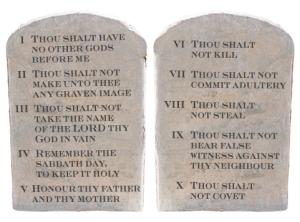
Texas Defies Supreme Court By Requiring Display of Ten Commandments in Schools
Last week, Texas Governor Greg Abbott and the state’s legislature have defied the federal government by passing a law requiring that the Bible’s “Ten Commandments,” in Exodus 20.2-17, be displayed in a 16″x20″ frame in all public schools and state-funded universities in Texas. This has happened before.
In 1980, Kentucky did the same, and the U.S. Supreme Court ruled it unconstitutional. Alabama went through this last year. And now, Louisiana is doing the same. It is happening only in states that are ruled by Republican governors and legislatures. In the Kentucky ruling, the Court said that the Ten Commandments is “undeniably a sacred text in the Jewish and Christian faiths” but that it “serves no … educational function.”
Christians Disagree About Requiring Public Display of the Ten Commandments in Schools
American Christians have never agreed about this. I find it a rather difficult issue. On the one hand, I honor the Ten Commandments as so important to my Christian faith. On the other hand, requiring them to be displayed in all public classrooms seems to me to be unconstitutional because of what is called “the Establishment Clause.” The First Amendment of the Constitution states, “Congress shall make no law respecting an establishment of religion, or prohibiting the free exercise thereof.” I think this means that the government must exercise a separation between church and state, better yet, separation between religion and state.
So, do the Ten Commandments establish a religion? For, that is what this argument is mostly about. I think the Ten Commandments clearly do establish a particular religion in the very first commandment. It says in the NRSV Bible version, “I am the LORD your God, … you shall have no other gods before me.” Both religious Jews and Christians honor the Ten Commandments which establish the Judeo-Christian faith.
God’s Name Is Not Father But YHWH
But there is something about the history the word translated “LORD” in this first commandment which I think is misleading so that some can argue it does not advocate a particular religion. And ask many Christians what God’s name is, and they’re liable to say “Father.” Many of them don’t understand that that is not a name but a title. And they don’t know that God’s name is YHWH in the Hebrew Bible.
The Hebrew word for “lord” is adon or adonay; but the Hebrew word here translated “LORD” in the first commandment is yhwh/YHWH, which is God’s name. The Hebrew Bible didn’t have vowels. In modern times, God’s name YHWH usually has been translated Yahweh or Yehvah. This is the only instance in the Bible in which someone’s name is translated with what is called a circumlocution, which in this case means simply another word. And God’s name YHWH appears in the Hebrew Bible almost 7,000 times.
Why Did Jews Quit Pronouncing God’s Name?
So, why don’t Bible versions just transliterate God’s name as Yahweh or Yehvah instead of substituting “LORD”? It is because in the 3rd century BCE, the Pharaoh of Egypt had Jewish scholars translate the Hebrew Bible into Greek, and for every occurrence of YHWH they translated with the Greek word for “lord,” which is kurios. Why did they do that?
Jews had taken a view that God’s name was so holy that it would be irreverent for humans to pronounce it, though the high priest could do so in ceremonies at the temple in Jerusalem. I believe they were correct in deeming God’s name sacred and holy and that in pronouncing it believers should always do so in awe and respect. But I also think it was wrong for Jews to decide not to pronounce God’s name at all. I think there are very clear texts in the Hebrew Bible (Old Testament) indicating that believers should say God’s name.
Do You Believe in God? What God?
In America, if you ask a person, “Do you believe in God?” people generally understand that that question assumes the God of the Bible, the God of Israel, the God of the Christians. But that is a narrow, myopic way of looking at things which denies the reality of the whole world, moreover, of world history. In India, with a population of over a billion people, where the very predominant religion is Hinduism, they believe in One Supreme Being (Brahman) who is manifested in countless forms, which many would say means millions of gods.
If our English Bibles were translated so that God’s name remained intact, as Yahweh or Yehvah, then that would present a slightly different view of the first of the Ten Commandments. That is, calling God by his name would look more like a religion, the religion of the God Yahweh.
What About the Sabbath?
The commandment to keep the Sabbath further establishes the Ten Commandments as instituting a particular religion. What is Sabbath-keeping? It does not mean go to church on Sunday, as many of us Christians used to believe when we were so ill-informed. Rather, it means to keep the seventh day holy, thus doing no work at all on that day. But the seventh day was from sundown Friday to sundown Saturday, thus not Sunday.
Sabbath keeping references God’s creation in Genesis which says, “And on the seventh day God finished the work that he had done, and he rested on the seventh day from all the work that he had done. So God blessed the seventh day and hallowed it, because on it God rested from all the world that he had done in creation” (Genesis 2.2-3). This repetition seems to affirm the importance of remembering this and God as creator. And it is the God of the Judeo-Christian faith who is this creator, which further establishes a particular religion.












